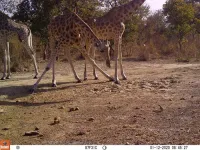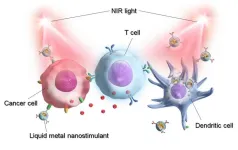(Press-News.org) Neuroscientists from HSE University have criticized the famous studies that question the free will of our decisions. You can’t shift responsibility for your actions to the brain. The results of the new work were published in the Neuropsychologia journal.
The dispute about how much free will people have in making their decisions has been going for decades. Neuroscientists have joined this discussion thanks to the electroencephalographic (EEG) experiments of Benjamin Libet. In the 1970-1980s, he showed that 0.5–1.5 seconds before conscious awareness of the intention to perform a movement, subjects emit EEG activity that predicts this movement. It turns out that the brain makes a decision and sends readiness potential before a person realises it, and our actions are nothing more than the result of an unconscious physiological process in the brain.
The results of Libet's experiments have generated a lot of controversy about free will, and some neurophysiologists have even concluded that it does not exist. Moreover, Libet's experiment has been repeated using functional magnetic resonance imaging, and it turns out that the decision of the subject can be predicted even 6-10 seconds before their conscious awareness of it.
The staff of the HSE Institute for Cognitive Neuroscience questioned this experimental paradigm and in their new study confirmed that the time of intention awareness in Libet's experiments was determined incorrectly. In addition, EEG activity, or the brain signal indicating the readiness of a decision, which was recorded by Benjamin Libet before the decision was made, actually has no direct link to this decision.
In the Libet's original experiment, the subjects were asked to occasionally bend their wrists and at the same time remember the moment when they felt ready to perform this action. The time of intention awareness was recorded from the words of the subjects themselves: they observed a point that moved along the screen-dial, similar to a clock hand, and indicated the position of the point when they felt the desire to bend their hand. The moment of the final decision was determined by the exact reading of the sensor attached to the wrist of the subjects.
The HSE neuroscientists repeated the experiment with two groups of subjects, adding small changes to the task in one of the groups. Using behavioral reports and hypersensitive EEG techniques, the scientists investigated the correlation between the time of intention awareness and the time of final decision. It turned out that the time of awareness can be influenced by experimental procedures: for example, without certain training, the subjects are barely able to determine their intentions, and the traditional Libet paradigm pushes them to the feeling that they can determine the moment of decision-making and intention. Apparently, the instruction itself in the Libet task makes the participants feel that the intention should emerge long before the final decision is made.
In addition, the study confirmed that there is no direct link between the activity of the brain preceding the action and the intention to perform the action. The sense of intention emerged in the subjects at different points in time, whereas the readiness potential was always registered at about the same time. Thus, the readiness potential may reflect the general dynamics of the decision-making process about making a move, but it does not mean that the intention to act has already been generated.
"Our study highlights the ambiguity of Libet's research and proves the absence of a direct correlation between the brain signal and decision-making. It appears that the classical Libet paradigm is not suitable for answering the question of whether we have free will while making decisions. We need to come up with a new approach to this extremely interesting scientific puzzle," says Dmitry Bredikhin, author of the research, Junior Research Fellow at the Centre for Cognition & Decision Making.
"Neuroscience tries to answer key questions in our life, including questions of free will and responsibility for our actions. We need to be especially precise in order to draw conclusions that affect our outlook and attitude to life. Therefore, we tried to understand the predetermination of our decisions and confirmed a number of shortcomings in the famous experiments of Benjamin Libet. This does not mean that we have closed this issue of the illusory nature of our free will, but rather emphasizes that the discussion continues. This might be one of the most interesting questions in modern science, to which we have yet to give a definitive answer," comments Vasily Klucharev, Project coordinator, Leading Research Fellow of the Institute for Cognitive Neuroscience.
END
HSE researchers question the correctness of experiments denying free will
You won’t shift responsibility for your actions to the brain!
2023-08-04
ELSE PRESS RELEASES FROM THIS DATE:
Kordofan giraffes face local extinction if poaching continues
2023-08-04
For immediate release
Friday 4 August 2023
Kordofan giraffes face local extinction if poaching continues
Poaching of two Critically Endangered Kordofan giraffes per year could result in extinction in just 15 years within Cameroon’s Bénoué National Park without intervention. These are the alarming new findings of a University of Bristol and Bristol Zoological Society-led study published in the African Journal of Ecology.
One of the last populations of Kordofan giraffes roam Cameroon's Bénoué ...
Team creates power generator that runs on natural atmospheric humidity
2023-08-04
Scientists are looking for ways to use the low-value energy widely distributed in natural environments to generate electricity. A research team has created a power generator that collects the natural atmospheric humidity and produces continuous electrical signals. This is the first humidity generator designed using a nano-sized material called polyoxometalates. It holds the potential of being a new research direction for polyoxometalates in the sustainable utilization of low-value energy.
The team’s work is published in the journal Nano Research on August 01.
The team set out to solve ...
New deep-learning approach gets to the bottom of colonoscopy
2023-08-04
Researchers have developed a pair of modules that gives a boost to the use of artificial neural networks to identify potentially cancerous growths in colonoscopy imagery, traditionally plagued by image noise resulting from the colonoscopy insertion and rotation process itself.
A paper describing the approach was published in the journal CAAI Artificial Intelligence Research on June 30.
Colonoscopy is the gold standard for detecting colorectal growths or ‘polyps’ in the inner lining of your colon, also known as the large intestine. ...
Influenza shows no seasonality in tropics, posing challenges for health care
2023-08-04
UNIVERSITY PARK, Pa. — In temperate climates, like North America and Europe, flu season starts in the fall, peaks in the winter and ends in the spring. While public health officials have generally assumed that influenza is also seasonal in tropical climates, new research led by Penn State has found little evidence of a repeatable pattern in influenza cases in Vietnam. The findings suggest that influenza is likely unpredictable throughout the tropics, posing substantial challenges for prevention and management of cases for the one-third of the global population living in tropical areas.
“The World ...
Prevalence, risk factors for school-associated transmission of SARS-CoV-2
2023-08-04
About The Study: In this study of Massachusetts schools, the secondary attack rate for SARS-CoV-2 among school-based contacts was low during two periods, and factors associated with transmission risk varied over time. These findings suggest that ongoing surveillance efforts may be essential to ensure that both targeted resources and mitigation practices remain optimal and relevant for disease prevention.
Authors: Sandra B. Nelson, M.D., of Massachusetts General Hospital in Boston, is the corresponding author.
To access the embargoed study: Visit our For The Media website at this link https://media.jamanetwork.com/
(doi:10.1001/jamahealthforum.2023.2310)
Editor’s ...
Racial, ethnic disparities in survival among people with second primary cancer
2023-08-04
About The Study: In this study of 230,000 persons with second primary cancers in the U.S., the Black population had a higher risk of death from both cancer and cardiovascular disease compared with the white population, whereas the Hispanic population had a higher risk of death from cancer. These results suggest that research priorities to address survival disparities in the growing population of survivors of multiple primary cancers are warranted.
Authors: Hyuna Sung, Ph.D., of the American Cancer Society in Atlanta, is ...
New study shows substantial racial and ethnic disparities among survivors of second primary cancers in the US
2023-08-04
ATLANTA, August 4, 2023 — In new findings from researchers at the American Cancer Society (ACS), non-Hispanic Black individuals diagnosed with a second primary cancer (SPC) experienced 21% higher cancer-related death rates and 41% higher cardiovascular-related death rates compared with their non-Hispanic White counterparts. The study also showed that Hispanic individuals diagnosed with a second primary cancer also experienced 10% higher cancer-related death rates compared with their non-Hispanic White counterparts, but 10% lower cardiovascular-related death rates. The paper was published ...
Novel liquid metal nanoparticles for cancer photoimmunotherapy
2023-08-04
Ishikawa, Japan -- Liquid metals (LM) such as pure gallium (Ga) and Ga-based alloys are a new class of materials with unique physicochemical properties. One of the most prominent applications of LMs is photothermal therapy against cancer, in which functional LM nanoparticles convert light energy to heat energy, thus killing cancerous cells. LM-based phototherapy is superior to traditional cancer therapy owing to its high specificity, repeatability, and low side effects.
In a new cutting-edge study, Associate Professor Eijiro Miyako and his colleagues from Japan Advanced Institute of Science and Technology (JAIST) synthesized multifunctional Ga-based nanoparticles that combine cancer ...
Study finds breastfeeding helps mother’s cardio health for 3 years or more
2023-08-04
Breastfeeding for six months or more appears to reduce the risk of cardiovascular problems developing in mothers for at least three years after delivery, a new South Australian study has found.
The surprising cardio-metabolic benefit for maternal health is particularly important for women who experienced a complicated pregnancy, which can increase their chance of developing cardiovascular disease (CVD) later in life.
The new results – published this month in the International Breastfeeding Journal by experts from the University of Adelaide ...
Long-term collection of patient-reported outcome data in oncology trials: Important and feasible
2023-08-04
Patient-reported outcome (PRO) data are collected in oncology trials to determine patients' perspectives of cancer treatment - unfortunately often too briefly, for example only up to the point when an x-ray shows tumour growth and treatment is discontinued. As a result, it is not possible, for example, to reliably assess the impact on patients' lives of disease progression seen on X-rays or the long-term side effects of cancer treatment. The reasons given for this are organizational difficulties or patients’ lack of interest in long-term follow-up. ...
LAST 30 PRESS RELEASES:
Of crocodiles, counting and conferences
AERA announces 2026 award winners in education research
Saving two lives with one fruit drop
Photonic chips advance real-time learning in spiking neural systems
Share of migratory wild animal species with declining populations despite UN treaty protections worsens from 44% to 49% in two years; 24% face extinction, up 2%
One in 20 babies experiences physical abuse, global review finds
Tundra tongue: The science behind a very cold mistake
Targeting a dangerous gut infection
Scientists successfully harvest chickpeas from “moon dirt”
Teen aggression a warning sign for faster aging later in life
Study confirms food fortification is highly cost-effective in fighting hidden hunger across 63 countries
Special issue elevates disease ecology in marine management
A kaleidoscope of cosmic collisions: the new catalogue of gravitational signals from LIGO, Virgo and KAGRA
New catalog more than doubles the number of gravitational-wave detections made by LIGO, Virgo, and KAGRA observatories
Antifibrotic drug shows promise for premature ovarian insufficiency
Altered copper metabolism is a crucial factor in inflammatory bone diseases
Real-time imaging of microplastics in the body improves understanding of health risks
Reconstructing the world’s ant diversity in 3D
UMD entomologist helps bring the world’s ant diversity to life in 3D imagery
ESA’s Mars orbiters watch solar superstorm hit the Red Planet
The secret lives of catalysts: How microscopic networks power reactions
Molecular ‘catapult’ fires electrons at the limits of physics
Researcher finds evidence supporting sucrose can help manage painful procedures in infants
New study identifies key factors supporting indigenous well-being
Bureaucracy Index 2026: Business sector hit hardest
ECMWF’s portable global forecasting model OpenIFS now available for all
Yale study challenges notion that aging means decline, finds many older adults improve over time
Korean researchers enable early detection of brain disorders with a single drop of saliva!
Swipe right, but safer
Duke-NUS scientists identify more effective way to detect poultry viruses in live markets
[Press-News.org] HSE researchers question the correctness of experiments denying free willYou won’t shift responsibility for your actions to the brain!



